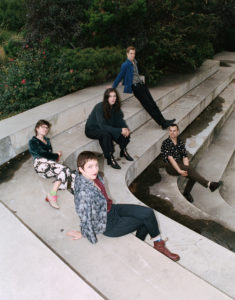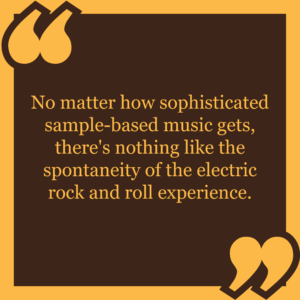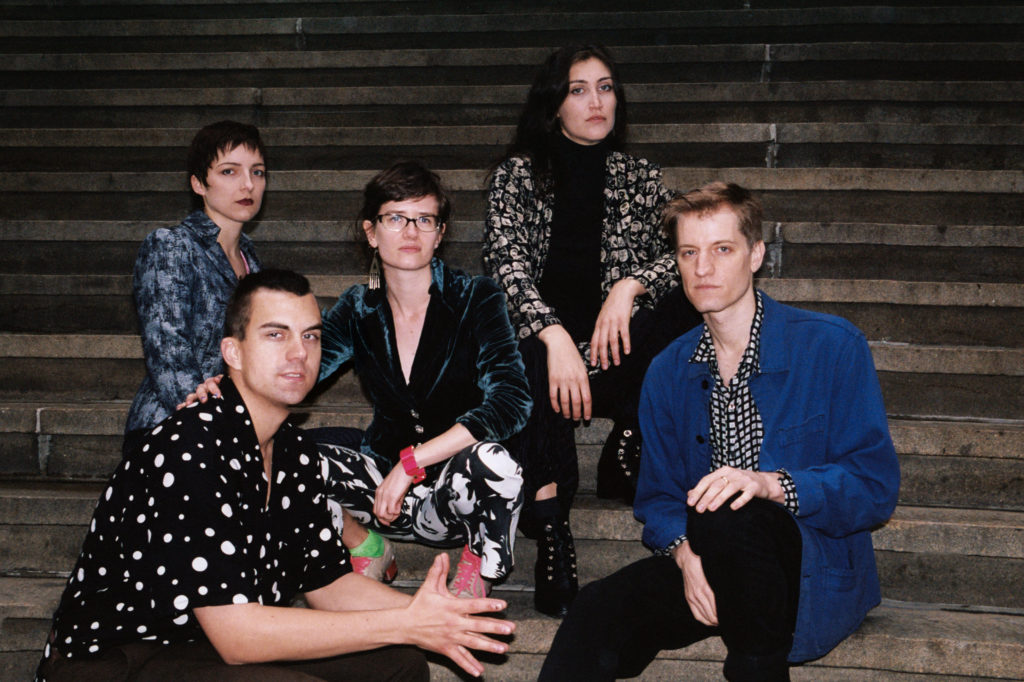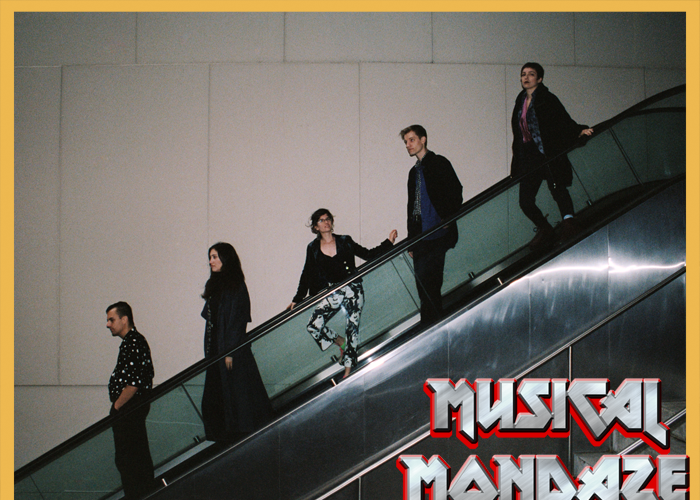
With their debut album “Endless Scroll” (out now on What’s Your Rupture), the Brooklyn-based art rock group Bodega isn’t peeling back the layers of music to see what’s beneath, but instead, adding layers so that there is substance at every level of its creation.
We recently sat down with guitarist/vocalist Ben Hozie and vocalist Nikki Belfiglio to discuss the experience they were trying to establish when creating the album, the reason they also view themselves as critics, and why the greatest function a band may perform is having no function at all.
TrunkSpace: Did the band set out to accomplish something on a macro level with the album?
Hozie: Yeah, “Endless Scroll,” it’s not necessarily a concept record in the way maybe you’re talking about, but we did wanna make a… the Bodega mantra is the best critique is self critique, so we went into it looking specifically at me and Nikki’s day-to-day existence, and I guess this was 2016, and flipping this, the critical lands on ourselves. Obviously, Web 2.0, social media, the Internet and just screens in general… we’re both filmmakers, and people say, “How is,” for example, “‘I Am Not A Cinephile’ related to staring at a computer?” To me, they’re the same thing. It’s a life lived through the screen, which isn’t even necessarily a good or a bad thing. It’s just how people live their lives. It’s how we live our lives right now.
TrunkSpace: We get that. The music itself is not always the hook anymore. It could be the visual. It could be the packaging. Not many people, at least in the younger generations, are just sitting around experiencing JUST the music.
Belfiglio: That’s why with the album we created a lyrical zine to go with it – the vinyl – with the intention to put on your headphones or put on the record and read along to the lyrics to get a full immersion into the album.
Hozie: Away from a computer screen.
TrunkSpace: So what the band set out to do was create something beyond just the music itself? You were creating an experience?
Hozie: Yeah, to me, that’s why rock and roll is still a valid art form, or a vital art form, because an electric live rock and roll moment can’t be duplicated. There’s so many different elements that go into it, whether it’s the five players of the group, or the room, or the people there, or the idiosyncrasies of the moment. No matter how sophisticated sample-based music gets, there’s nothing like the spontaneity of the electric rock and roll experience.
TrunkSpace: And seeing a live show, especially now when we seem so divided as a society, it’s one of the last communities. You go and you can all have a sort of common focus.
Hozie: Yeah, or not. I often wonder, no two people experience the same event in the same way at all. That’s pretty apparent when you read reviews of records or books or whatever. It’s like, “Are they hearing the same thing I’m hearing?” And they’re not. That’s why a good friend of mine says, “You should never feel bad about criticism from someone who’s dull.” That says more about them than it does about you.
TrunkSpace: Well, an in the social media age, everyone is a critic.
Hozie: I feel the way people most listen to music is, they’re 20 seconds in and they’ve already decided whether they like it or not, just on whether the vibe of it is what their brain wants to hear. Or, whether the color of the record sleeve is… is the palette pleasing to them? So, in 20 seconds they’ve already made up their mind. In fact, they’ve probably already made up their mind before they clicked on it.
Belfiglio: ‘Cause of the name.
Hozie: Yeah. I think you could only really enjoy music if you go into it wanting to like it. You have to have that openness, and even the way I listen to music, I don’t want to do this, but I find my brain doing it – I’m making critical judgments before a song is even over. That’s just the way the world works now, which is for better or worse.
TrunkSpace: So as artists, is that daunting to you both as musicians but also as filmmakers knowing that the way people are absorbing things is different than it once was?
Hozie: I think we’re trying to adapt with the times, and part of what I see Bodega doing is functioning as a critical apparatus as well. I mean, all inherent art making is sort of critical in the sense that by choosing to play a certain type of music, you’re critiquing, inherently, the other kinds of music that you’re not playing. I see a lot of our best songs as little pocket essays. They’re not critical in the sense of thumbs up or thumbs down, but they’re critical in the sense of… I relate to, for example – this is a film analogy – but the French new wave guys all started out as critics before they were making films. I feel like there’s an element of that in our band.
TrunkSpace: In creating art you kind of have to be a critic in a way, because if you can’t judge your own work and fall in love with it in some way, the end user can always sense that.
Hozie: Yeah.
Belfiglio: You recognize it’s real.
Hozie: Yeah, that’s absolutely right.

TrunkSpace: So when you look at the messaging within the songs, were you looking to say something that people could not only enjoy in the moment, but also walk away from – leave the show, put down the album – and kind of think or find a different point of view within (or because of) something that you were saying?
Hozie: Absolutely. I think the goal of any artist’s work is to simply… well, I said this before, but I think the first goal that you need to do is you need to tell the truth. The secondary goal is to sort of de-program. I say it a lot in Bodega. What we’re trying to do is point out the sort of hidden things that are holding up the pillars of not only rock music, but just the inherent cultural underpinnings. Like for example, in our track “Can’t Knock the Hustle,” it might be kind of obvious, but the cultural logic behind late capitalism is expressed in almost all pop music – the idea that you can’t knock the hustle. So that song is kind of meant to poke at that, and it kind of becomes a dumb arena sports anthem. But obviously the message is that you can knock hustle. It’s more complicated than that because it’s referring to the Jay-Z song. I think Jay-Z’s message of not being able to knock the cocaine hustle when you come from an underprivileged background, and you’re slinging coke in Brooklyn or whatever… you can knock his hustle. That’s his point. The song playfully extends his logic outside of the context where his logic doesn’t make sense anymore, which is the ice cream parlor. I heard one of the bosses there in that ice cream parlor… so it was all African Americans, mostly Jamaican guys, who worked in this ice cream shop, and it was all white people from the Hamptons who were the managers. These guys, who are listening to Jay-Z would kind of say, “Well, you know, our bosses are clearly racist in some way, and they’re exploiting us, but you can’t knock the hustle ’cause they’re just doing what they can to feed their families and get bigger houses out in the Hamptons.” And you wanna be like, “No, you can knock the hustle!” (Laughter)
TrunkSpace: It seems like nowadays, in the climate that we’re in, people are scared to knock the hustle. They’re worried what’s going to come back on them.
Hozie: Right. I’ve been thinking about this a lot. One of the great premises of DIY culture is based on functionality. I’m thinking about, like, Fugazi’s “Waiting Room.” Function. Function is the key. Or the promise of the Minutemen. We jam econo, and we’re going to hop in the minivan, drive to the next town with the most limited means possible, and we’re gonna increase our functionality as much as possible. Sort of like a Utopian capitalist fantasy in a way. That’s what a band has to do too. It has to create as much content as possible. It has to function. But I’m wondering if maybe the most radical thing you can do is to not have any function at all. To be completely useless.


